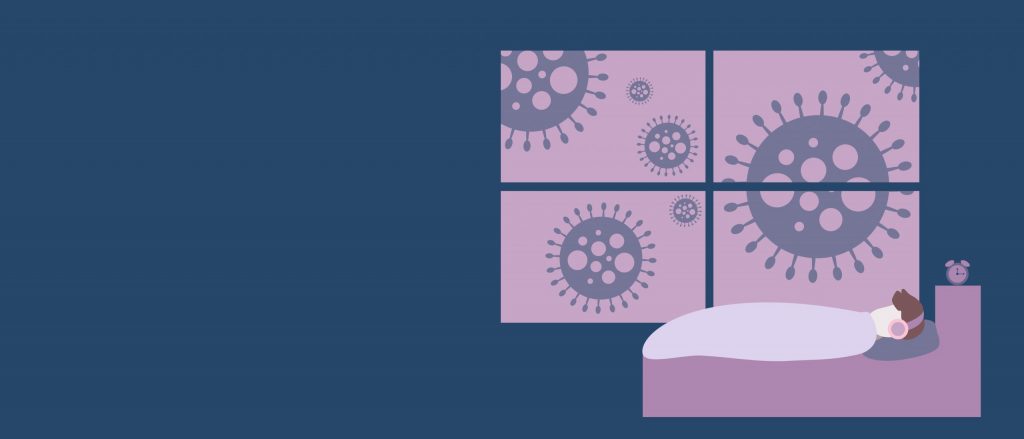Covid-19 and sleep
Sleep Science Friday
Yes! It’s Friday! Grab a coffee (or tea) and end your week with a quick recap of Sleep Science News and ESRS updates!
COVID-19 and sleep (31 July 2020)
The COVID-19 pandemic has upended our lives—with forced lockdowns, reduced travel, as well as job and financial insecurity during a worldwide economic recession. Although, many currently have reduced commuting time, more quality time with family, and the flexibility to work remotely (for some), learning to re-adjust schedules and coping with additional stressors (particularly as essential workers or those with children), has undoubtedly affected our sleeping quality and sleep patterns.
Clea Simon (Harvard Correspondent), noted that “Sleep is emerging as the latest casualty of the COVID-19 crisis”, as people adjust to new realities. Healthcare workers, medical students, university students and administration staff, as well as essential workers face increased psychological distress—balancing work-life-sleep in the midst of a pandemic. Those in quarantine (or other lockdown situations) face disruptions to daily life patterns and reduced social support systems (via social distancing rules). With irregular sleep schedules, less exposure to daylight, less physical activity, depression, anxiety, and more screen time, many currently report lower sleep quality—despite perhaps, longer sleep duration.
This is alarming given that sleep quality is linked to immune system functioning and overall health—meaning that those with sleep issues may be at higher risk of contracting the virus. For example, underlying sleep disorders, such as obstructive sleep apnea, appear to increase SARS-Cov-2 susceptibility, as well as the clinical manifestation of the disease. King et al. (2020) also found that lockdown policies and social restrictions disrupted circadian rhythms (via e.g. energy imbalance, natural and artificial light exposure), with potential long-term consequences on cardiometabolic health.
As we are social animals, social bonds and physical contact partially mediate the hypothalamic-pituitary-adrenal (HPA) axis (the central physiological stress response system)—with reduced social contact affecting our overall physical and mental health. In chronic sleep deprivation, impaired HPA-axis function is observed, as well as low-grade systemic inflammation—negatively affecting our mental state and ability to fight infections. Sleep also plays a key role in emotional regulation, with sleep quality particularly affecting older adults in social isolation. For students, Marelli et al. 2020 found worsening sleep quality, along with insomnia symptoms, anxiety and depression during the lockdown.
Those with pre-existing mental health disorders are also at higher risk of infection and disease progression. Moreno et al. (2020) warn that severe mental illness, alcohol and drug abuse, homelessness (and comorbid physical conditions) correspond to higher risks in contracting the disease, developing severe organ dysfunction, and succumbing to the disease compared to those without mental disorders. Therefore, addressing sleep issues and sleep disorders should not be discounted as a preventative measure against infection, along with the development of other disorders.
Recovery from COVID-19 and sleep?
For those who survive COVID-19, the path to recovery is not always easy; COVID-19 is a multi-system disease affecting more than just the lungs, with damage seen in the heart, GI tract, and liver. Reports of “long haulers”, or those with ‘post-Covid syndrome’, exhibit a myriad of persistent symptoms, including myocardial damage (especially for those already with cardiovascular disease, but also in younger individuals without), dizziness, depression, upset stomach, pins and needles, extreme lethargy, brain fog, shortness of breath, trouble breathing, memory loss, body aches, heart palpitations, rashes, and more.
Scientists propose that COVID-19 appears to alter the immune response during the early stages of infection and can trigger an exaggerated and dysregulated immune response. Some studies also suggest “the possibility of a high residual viral load…in convalescent patients” that leads to persistent and unpredictable symptoms—leaving patients often confused and frustrated. However, chronic symptoms following infectious diseases are not novel. Post-viral fatigue often becomes more common following infectious outbreaks, including the SARS epidemic in 2003, where 27% (of 233) Hong Kong residents continued to suffer from chronic-fatigue problems 3 years post-infection. Accordingly, researchers and healthcare workers need to be aware and prepared for the potentially long road of recovery for many COVID-19 survivors.
Additionally, damage to the central nervous system and peripheral tissues can negatively affect cardiorespiratory control. This leads to worsening sleep quality in recovered patients and the development of sleep disorders (and consequently other health issues). Indeed, as seen in other illnesses caused by coronaviruses (including Sever Acute Respiratory Syndrome and Middle East Respiratory Syndrome), many patients experienced sleep disorders, including insomnia, following recovery.
Given the unpredictability of the future and also the progression of the disease and recovery period, medical health workers need to also consider the treatment of patient’s mental health. For those discharged after recovery, high rates of post-traumatic symptoms are being reported, along with depression and anxiety. Moreno et al. (2020) suggest that “SARS-CoV-2 might also cause dysregulation of the stress system, which could contribute to the development or exacerbation of psychiatric disorders” and that elderly people are particularly vulnerable, as they are more likely to experience severe disease symptoms and may have pre-existing cognitive decline.
As sleep is linked to both physical and mental health, Meira et al. (2020) stated that “the unique potential links between Sars-Cov-2 and circadian rhythms and sleep…suggest the possibility that both of these homeostatic processes may significantly modify the susceptibility to infection as well as the overall clinical manifestation of the disease”. The authors suggest that “implementation of healthy sleep measures as a protective strategy against infection, and early detection of patients at risk for more severe disease…may enable improved implementation of supportive measures and lead to better outcomes.”
Without knowing how long the pandemic will last, chronic sleep disturbances may soon become widespread. Therefore, maintaining proper sleep hygiene and having access to mental health care is pivotal in preventing long-term adverse health outcomes to those directly and indirectly affected by COVID-19.
Want to know more about how COVID-19 is affecting your health and sleep?
- “Depression as a Mediator of Chronic Fatigue and Post-Traumatic Stress Symptoms in Middle East Respiratory Syndrome Survivors” (2019 January, Psychiatry Investigation)
- “Dealing with sleep problems during home confinement due to the COVID-19 outbreak: Practical recommendations from a task force of the European CBT-I Academy” (4 April 2020, Journal of Sleep Research)
- “Why it’s important to get a good night’s sleep during the coronavirus outbreak” (16 April 2020, UChicago Medicine)
- “The connection between coronavirus and sleep issues” (21 April 2020, Parkview Health)
- “’Weird as hell’: the Covid-19 patients who have symptoms for months” (15 May 2020, The Guardian)
- “Sleep problems and medical isolation during the SARS-CoV-2 outbreak” (June 2020, Sleep Medicine)
- “Coronavirus ‘Long-Haulers’ have been sick for months. Why?” (12 June 2020, NPR)
- “I’m a Covid-19 ‘long-hauler’. For us, there is no end in sight” (26 July 2020, The Guardian)
- “This COVID-19 ‘Long-Hauler’ has had symptoms for more than 120 days” (27 July 2020, Prevention)
Interested in or working on sleep and sleep disorders?
Due to COVID-19, the 25th Congress of the ESRS goes Virtual–so you can attend even in your pajamas from anywhere worldwide.
Check out our #ESRS2020 Scientific Programme on our website.
For Spanish speakers, #ESRS2020 will be a joint congress with the Spanish Sleep Society. Both meetings are coordinated in parallel; attendants can participate in both meetings with only one registration. Keynote speakers from #ESRS2020 will have Spanish translations.
We will also have poster sessions, teaching courses, networking lounges, and a stream for early career researchers.
Don’t forget to register before 14 Aug for early bird registration fees.
Just published an article? Want your research to be featured? Saw something interesting? Contact: doris.wu [ at ] esrs.eu.




